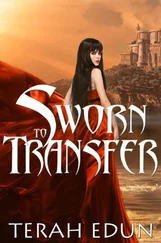When they finished, the dancing began. The young man on the whistle was joined by other local musicians, playing pan pipes, shaking rattles and beating tambourines. People left their benches and started to dance in the centre of the hall. Determined to enjoy themselves, men coaxed women out of the crowd of onlookers, and the music became more cheerful and spirited and everyone began to clap and sing. None of the august guests danced, of course, they merely looked on. I could see that the dancing was uncomplicated, a few steps forward, a few steps back, a sideways shuffle. To escape from my drunken neighbour, whose head was beginning to loll heavily against my shoulder, I decided to try. A little fuddled, I rose from my bench and joined the dancers. Among the line of women and girls coming towards me, I realised, was the girl harpist. She was wearing a bodice of russet red and a skirt of contrasting brown, which showed off her figure, and with her brown hair cut short and lightly freckled skin, she was the picture of fresh womanhood. Each time we passed she gave my hand a little squeeze. Gradually the music grew faster and faster, and the circles whirled with increasing speed, until we were short of breath. The music rose to a crescendo and then stopped abruptly. Laughing and smiling, the dancers staggered to a halt and there in front of me was the harpist girl. She stood before me, triumphant with her evening's success. Still intoxicated, I reached forward, took her in my arms and gave her a kiss. A heartbeat later, I heard a short, loud crash. It was a sound that few people in that gathering could have ever heard in their lives — the sound of expensive glass shattering. I looked up and there was Aelfgifu, standing up. She had flung her goblet on the table. As her uncle and his guests looked up in amazement, Aelfgifu stalked out of the hall, her back rigid with anger.
Swaying tipsily, I suddenly felt wretched. I knew that I had offended the woman I adored.
"War, hunting and love are as full of trouble as they are of pleasure.' Edgar launched another of his proverbs at me next morning, as we were getting ready to visit the hawk shed, which he called the hack house, and feed the hawks.
"What do you mean?' I asked, though I had a shrewd idea why he had mentioned love.
'Our lady's got a quick temper.'
'What makes you say that?'
'Come on, lad. I've known Aelfgifu since she was a skinny girl growing up. As a youngster she was always trying to get away from the stuffiness of the burh. Used to spend half her days with my wife and me down at the cottage. Playing around like any ordinary child, though she tended to get into more mischief than most. A real little vixen she could be when she was caught out. But she's got a good heart and we love her still. And we were very proud when she was wed to Knut, though by then she had become a grand lady.'
'What's that got to do with her bad temper?'
Edgar paused with his hand on the door into the hack house, and there was a glint of amusement in his eyes as he looked straight at me. 'Don't think you're the first young man she's taken a fancy to,' he said. 'Soon after you arrived, it was clear that you were not cut out to be kennelman. I began wondering why you were brought all the way from London and I asked the steward, who told me that you had been included in my lady's travelling party on her particular instructions. So I had my guess, but I wasn't sure until I saw her tantrum last night. No harm in that,' he went on, 'Aelfgifu's not been so well treated these past months, what with that other queen, Emma, and Knut being away all the time. I'd say she has a right to her own life. And she's been more than good to me and my wife. When our daughter was taken by the Danes, it was Aelfgifu who offered to pay her ransom if she was ever located. And she would still do so.'
The hawking season was now upon us, and for the previous two months we had been preparing Edgar's hunting birds as they emerged from their moult. The hack house contained three peregrine falcons, a merlin, and a pair of small sparrowhawks, as well as the costly gyrfalcon which had first got me into trouble. The gyrfalcon, Edgar pointed out, was worth its weight in pure silver or 'the price of three male slaves or perhaps four useless kennelmen'. He and I would go into the hack house every day, to 'man' the birds as he put it. This meant picking them up and getting them used to being handled by humans while feeding them special titbits to increase their strength and condition as their new feathers grew. Edgar proved to be just as expert with birds as he was with hounds. He favoured a diet of goslings, eels and adders for the long-winged falcons and mice for the short-winged hawks. Now I learned why there was sandy floor beneath their perches: it allowed us to find and collect the droppings from each bird, which Edgar examined with close attention. He explained that hunting birds could suffer from almost-human ailments, including itch, rheum, worms, mouth ulcers and cough. When Edgar detected a suspicion of gout in one of the peregrines, an older bird, he sent me to find a hedgehog for it to eat, which he pronounced to be the only cure.
Most of the birds, with the exception of the gyrfalcon and one of the sparrowhawks, were already trained. When they had their new feathers, it was only necessary to reintroduce them to their hunting duties. But the gyrfalcon had recently arrived in the hack house when I first saw it. That was why its eyelids had been sewn shut. 'It keeps the bird calm and quiet when it's being transported,' Edgar explained. 'Once it arrives in its new home, I ease the thread little by little so that the bird looks out on its surroundings gradually and setdes in without stress. It may seem cruel, but the only other method is to enclose its head in a leather hood, and I don't like to do that to a bird captured after it has learned to hunt in the wild. Putting on the hood too soon can cause chafing and distress.'
Edgar also had a warning. 'A dog comes to depend upon its master, but a hunting bird keeps its independence,' he said. 'You may tame and train a bird to work with you, and there is no greater pleasure in any sport than to fly your bird and see it take its prey and then return to your hand. But always remember that the moment the bird takes to the air it has the choice of liberty. It may fly away and never return. Then you will suffer falconer's heartbreak.'
Their free spirit attracted me to the hunting birds and I quickly found that I had a natural talent for handling them. Edgar started me off with one of the little sparrowhawks, the least valuable of his charges. He chose the one which had never yet been trained and showed me how to tie six-inch strips of leather to the bird's ankles with a special knot, then slip a longer leash through the metal rings at their ends. He equipped me with a falconer's protective glove, and each day I fed the hawk its diet of fresh mouse, encouraging it to leap from the perch to the warm carcass in my hand. The sparrowhawk was shrill and bad tempered when it first arrived - a sure sign, according to Edgar, that it had been taken from the nest as a fledgling and not caught after it had left the nest - yet within two weeks I had it hopping back and forth like a garden pet. Edgar confessed he had never seen a sparrowhawk tamed so fast. 'You seem to have a way with women,' he commented, slily because only the female sparrow-hawk is any use for hunting.
Not long afterwards he decided that I was the right person to train the gyrfalcon. It was a bold decision and may have been superstitious on Edgar's part, thinking that I would have some special understanding of the spear falcon because I came from its homeland. But Edgar knew that I had been brought to Northampton at the express wish of Aelfgifu, and he may have been playing a deeper game. He made me the gyrfalcon's keeper. I handled her - she was also a female - two or three times each day, fed her, bathed her once a week in a bath of yellow powder to get rid of lice, gave her chicken wings to tug and twist as she stood on her perch so her neck and body muscles grew strong, and held out my glove, a much stouter one this time, so she could hop from perch to hand. Within a month the gyrfalcon was quiet enough to wear a leather hood without alarm, and she and I were allowed outside the hack house, where the splendid white and speckled bird flew on a long leash to reach lumps of meat I placed on a stump of wood. A week after that and Edgar was tossing into the air a leather sock dressed with pigeon's wings, and the gyrfalcon, still tethered, was flying off from my glove to strike the lure and pin it to the ground and earn a reward of gosling. 'You have the makings of a first-class falconer,' Edgar commented and I glowed with satisfaction.
Читать дальше








